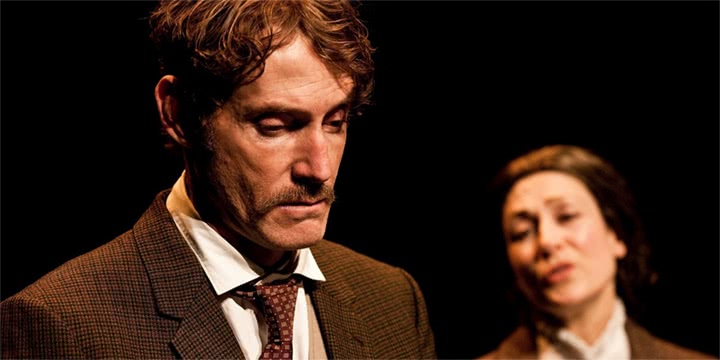For 30 years, Henry Lawson’s profile was on the back of the $10 note.
When the design was retired in 1993, by sheer coincidence he was replaced with the face of Dame Mary Gilmore, a woman whose name has not achieved quite the same literary significance as that of Lawson, but whose life and work is just as vital to Australia’s cultural heritage.The coincidental aspect is that the pair were also in a doomed relationship; it seems fitting that they now share a connection to such a ubiquitous feature of everyday life. In All My Love, director Denny Lawrence brings their story to the Sydney stage.
“What’s interesting is that [writer] Anne Brooksbank tells the story through the eyes of Mary Gilmore,” Lawrence explains, “who was a lifelong friend and campaigned successfully at Lawson’s death to have a State Funeral, who stood by him even when he became a bit of a drunk and a sad sack. He was a tremendous talent, and that was the thing she recognised. In his day, when it was frowned upon, he was like so many people now in the Michael Hutchence, Amy Winehouse pop singer kind of way who get into a great deal of trouble because of drugs and alcohol. In his day, that wasn’t something that people talked about at all, but it was part of his personality. He was a depressive, he’d had a very tough upbringing, he was substantially deaf. I mean, he had a lot of things to work against.”
Alongside Banjo Paterson, Lawson’s legacy as one of Australia’s greatest writers has proved rather unassailable over the years, and with reason; though dated, his short stories are still held up as classics of the form. Yet Gilmore too was a hugely accomplished author and a prominent figure for social change. Across poetry and journalism, her advocacy for women’s equality and indigenous rights led to her appointment as Dame Commander. But today, the number of people familiar with these names outside an academic setting is dishearteningly low.
“Quite a few people may have heard these names for some reason, it pops up even in schools today,” says Lawrence. “One or two of Lawson’s poems or stories are always just around somewhere, and people might not have read them but they’ll certainly know the name. Much like Mark Twain if you’re an American. But I don’t know how many people have read a lot of Lawson under the age of 50. People want to see something that connects with them, and these people do.
“There are loads of films out at the moment with the Oscars season on that are period pieces, whether it’s Suffragette or Carol or what have you, where we look at women’s situation in society. I think people like to be reminded of the journeys that we’ve gone on, both as creative people and as humans. In All My Love, [Lawson and Gilmore’s] relationship is fascinating as well in the way it was controlled so much by their respective mothers. It’s a story that touches a lot of people. There are a lot of damp eyes in the house because of what happened to Lawson and what happened to their relationship.”
The end of the 19th century was a watershed time in Australia’s history. Federation was inching closer, industrial struggles were ushering in pockets of fervent nationalism, racism was rife and an economic depression made life difficult across the country. Against this backdrop, All My Love conjures a romance that history has largely overlooked, despite the notoriety and impact of both Gilmore and Lawson.
“What impressed me was that audiences could go on this journey that really covers a long piece of history,” Lawrence says. “We had to do it episodically, so we had to find a way to stage it that engaged them across that period, and they really do connect and follow it very well. There’s a lot of information there that many people don’t know about, about the South American New Australia experiment, about Henry and Mary’s relationship. They really follow it closely, and what I’ve noted is that people are standing around talking about it afterwards. They get very worked up about Henry’s mother Louisa, who isn’t even in the play! She’s talked about a good deal, and is a catalyst for a lot of things that happen – a wonderful character in her own right – and they talk about her with great alacrity. It’s so gratifying.”
It is Lawrence’s hope to not just stage an entertaining piece of theatre. He and Brooksbank have been developing this production for several years, and the opportunity to reinvigorate such a distant literary love has not been handled lightly. Though their names might be known, the substance of Gilmore’s and Lawson’s lives and works runs a genuine risk of slipping from our common culture. All My Love is committed to seeing this reversed.
“I’d love [audiences] to go back to the work, to go back and reappraise the writing of Mary Gilmore and Henry Lawson. Our literary tradition, our cultural heritage is very important, and we get swamped so much these days by American culture. It’s great to go back and look at the history and cultural roots that we have. Australia has a tremendous literary heritage. I still think we’re a bit unsophisticated in performing arts, certainly in drama. But we’re a terrific country for literature, so I hope it inspires people to experience that.”
Riverside Theatre Parramatta hosts All My LoveTuesday February 16 – Saturday February 20, then it’s on to Glen St Theatre, Tuesday March 1 – Sunday March 6.



































